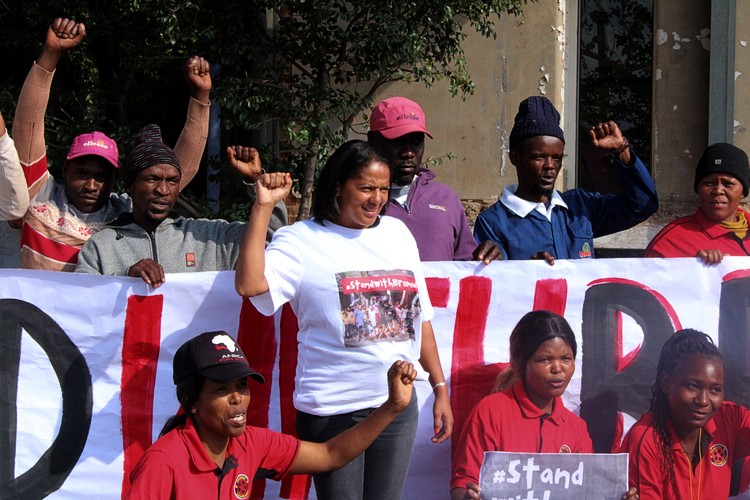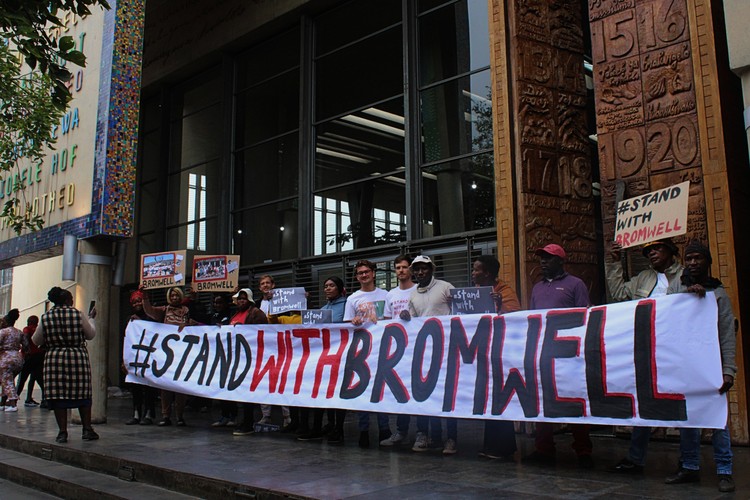Echoes of District Six evictions in case before the Constitutional Court
Judges question City of Cape Town about eviction of Bromwell Street tenants
Bromwell Street resident Charnell Commando (centre) said the case was important, not just for her community but for anyone who may face eviction. Photo: Masego Mafata
- The City of Cape Town appeared before the Constitutional Court on Tuesday in a case concerning the eviction of tenants from Bromwell Street, Woodstock.
- Justice Mbuyiseli Madlanga asked the City whether the planned eviction resembled the forced removals from District Six during apartheid.
- Ndifuna Ukwazi, on behalf of the Bromwell Street tenants, has argued that the City’s exclusion of emergency accommodation in its housing plans for the inner-city is unconstitutional.
- The City said it was not obliged to provide emergency accommodation in the inner-city.
- Judgment was reserved.
Judgment in the eviction of City of Cape Town tenants from Bromwell Street in Woodstock was reserved in the Constitutional Court on Tuesday.
During the hearing, Justice Mbuyiseli Madlanga asked the City if the eviction echoed the displacement of families from District Six under apartheid. “Is this not a refined, modern-day District Six type of displacement?” asked Justice Madlanga.
Housing advocacy group Ndifuna Ukwazi (NU), on behalf of the Bromwell Street residents facing eviction, had approached the Constitutional Court to appeal against a 2023 judgment of the Supreme Court of Appeal which overturned an order by the Western Cape High Court. The High Court had ruled in 2021 that the City’s emergency housing policy is unconstitutional and ordered the City to provide emergency housing in the inner city for the Bromwell Street families.
The Bromwell Street cottages were bought by Woodstock Hub Pty Ltd, a property development company, for R3.15-million in 2013.
The residents began their protracted legal battle against their eviction in 2016. They are long-term tenants of the cottages who work and attend schools in surrounding areas and the inner city. Among their requests has been that the City provide emergency accommodation in the inner city so that they can stay close to their places of work and schooling.
Arguing for the residents, advocate Sheldon Magardie said the City prioritised social housing over accommodation in the inner city, and this ultimately excluded people rendered homeless following an eviction. This, Magardie argued, was unreasonable, irrational and unconstitutional. Many of the Bromwell Street residents would not qualify for the City’s social housing programmes “because they don’t earn enough money to qualify”, said Magardie.
The City’s social housing programme, for which houses in Woodstock are still to be built, is “a rental or co-operative housing option for households earning between R1,850 and R22,000 a month,” according to this Western Cape Government website.
“The inevitable outcome for any person in need of emergency housing in the inner city is relocation to the Incremental Development Areas or Temporary Relocation Areas on the outskirts of the city,” Magardie told the court.
In a lengthy exchange between Justice Leona Theron and Magardie, Justice Theron questioned the lack of clarity from NU regarding which specific housing policy and which specific sections in that policy were unconstitutional.
Magardie responded by saying that the City did not have a singular housing policy but relied on various pieces of legislation and policies.
On behalf of the City, advocate Karrisha Pillay SC argued that no legislation or policy made it an obligation for the City to provide emergency accommodation in the inner city for people who have been evicted in the inner city. “The City does not have emergency accommodation in the inner city,” she said.
Pillay said the City had made offers of temporary emergency housing in Wolwerivier, Maitland and Kampies, all of which had been rejected by the Bromwell residents.
Is this a special case?
Acting Justice Matthew Chaskalson asked advocate Magardie whether the Bromwell Street case should be treated as a special case or an ordinary eviction case.
“We are dealing with lawful tenants who were only evicted because of the consequences of the City’s housing policy. We are not talking about illegal occupiers … This particular community is one of a handful of communities that managed to survive apartheid intact, in a white area … What this process is doing is aggravating spatial apartheid by pushing poor coloured people to the outskirts of the city,” said Justice Chaskalson. He said this made him wonder whether the case should be treated as a special case.
Magardie argued that this was indeed a special case. He said the historical context of Bromwell Street and the question of spatial justice made the City’s action against the Bromwell families unreasonable.
Abahlali baseMjondolo, represented by the Socio-Economic Rights Institute of South Africa, supported NU as amicus curiae, and also argued for a special case as it could develop the law to give sufficient guidance on the location of emergency accommodation.
Advocate Jason Brickhill, on behalf of Abahlali, told the court that currently the law does not give clear guidance on the location of emergency accommodation or on access to services in the accommodation.
But Pillay argued that the applicants had at no point pleaded the case as a special case. She added that if the case had been pleaded as such, the City “may have well said we’ll drop two social housing programmes for emergency housing programmes” in the inner city. But, she said, as it stands, the City does not have the funds or the land available to create emergency accommodation in the inner city because ten of the 11 land parcels that the City owns are designated for social housing.
Judgment was reserved.
About 30 supporters from Abahlali baseMjondolo at the Constitutional Court to show their support for the Bromwell Street residents. Photo: Masego Mafata
Support independent journalism
Donate using Payfast

Don't miss out on the latest news
We respect your privacy, and promise we won't spam you.
© 2024 GroundUp. This article is licensed under a Creative Commons Attribution-NoDerivatives 4.0 International License.
You may republish this article, so long as you credit the authors and GroundUp, and do not change the text. Please include a link back to the original article.
We put an invisible pixel in the article so that we can count traffic to republishers. All analytics tools are solely on our servers. We do not give our logs to any third party. Logs are deleted after two weeks. We do not use any IP address identifying information except to count regional traffic. We are solely interested in counting hits, not tracking users. If you republish, please do not delete the invisible pixel.


